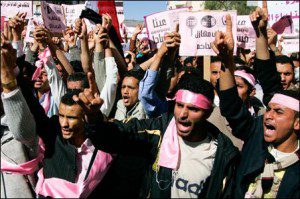13 Feb 2012 | Middle East and North Africa, News and features, United Kingdom
 The global police organisation went beyond its remit in pursuing Saudi Arabian journalist Hamza Kashgari, says Denis MacShane MP. Now we must ensure the kingdom’s authorities respect free speech
The global police organisation went beyond its remit in pursuing Saudi Arabian journalist Hamza Kashgari, says Denis MacShane MP. Now we must ensure the kingdom’s authorities respect free speech
(more…)
9 Feb 2012 | Middle East and North Africa, Uncategorized
On 10 February, Abdel Aziz Al-Jaridi, director of two daily newspapers, Al-Hadath and Kul-Anas, will appeal a defamation conviction. Al-Jaridi was sentenced to four months in prison by the first instance court on 13 June 2011 for defaming Al-Jazeera news anchor Mohamed Krichen.
Krichen lodged a complaint against Al-Jaridi in April of last year. On 6 February, the Committee to Protect Journalists (CPJ), called on Tunisian authorities to drop the jail term given to Al-Jaridi.
“Tunisian appeals court should throw out the prison sentence against journalist Abdel Aziz al-Jaridi at a 10 February hearing and authorities should use his case as an opportunity to break from the repressive practices of Zine El Abidine Ben Ali’s era,” said the CPJ.
Journalists in Tunisia can face up to six months in prison for defamation.
Al-Jaridi, considered to be a supporter to the former regime, is known for his articles defaming opposition figures and dissident voices during the rule of Zeine El Abidin Ben Ali.
27 Jan 2012 | News and features
 After a year of political unrest following the Arab Spring, Iona Craig reports on the current situation in Yemen.
After a year of political unrest following the Arab Spring, Iona Craig reports on the current situation in Yemen.
(more…)
26 Jan 2012 | Middle East and North Africa, News and features
 One year on, protesters are still demanding freedoms in the square that became a byword for the Arab Spring. Shahira Amin reports
One year on, protesters are still demanding freedoms in the square that became a byword for the Arab Spring. Shahira Amin reports
(more…)
 The global police organisation went beyond its remit in pursuing Saudi Arabian journalist Hamza Kashgari, says Denis MacShane MP. Now we must ensure the kingdom’s authorities respect free speech
The global police organisation went beyond its remit in pursuing Saudi Arabian journalist Hamza Kashgari, says Denis MacShane MP. Now we must ensure the kingdom’s authorities respect free speech

